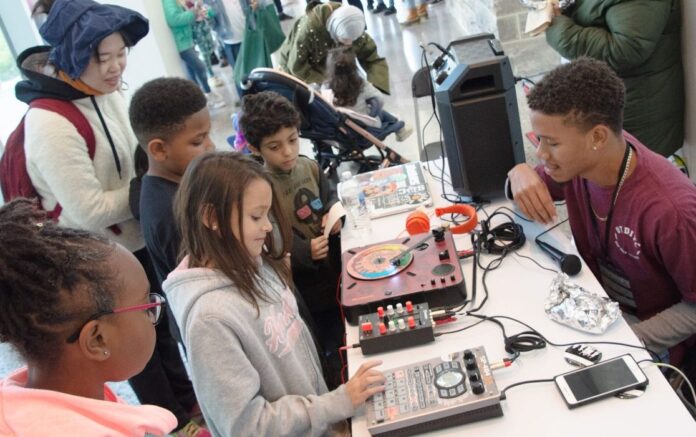The Virginia Tech Science Festival returns to Virginia Tech’s Blacksburg campus for its ninth year on Nov. 12 with more than 50 free hands-on learning interactive booths and activities that showcase dozens of science education and research programs throughout the university.
The Science Festival will take place from 10 a.m. to 3 p.m. at the Moss Arts Center, Torgersen Bridge, and the Carol M. Newman Library. All events are free and open to the public. Parking is available at Virginia Tech’s North End Center parking deck and other campus locations.
“We are excited to return to all in-person experiences this year and with more connections to the arts and design,” said Phyllis Newbill, festival chair and associate director of educational networks with Virginia Tech’s Center for Educational Networks and Impacts within the Institute for Creativity, Arts, and Technology. “Scientific thinking — the practice of collecting data to support decisions — is used in academic disciplines outside the traditional sciences. We’ll explore how robots can be used to make art, how virtual reality can help us organize primary sources in history, and how art can be used to understand environmental issues.”
Held since 2014, this expo-style, family-friendly event reaches 4,000 to 6,000 visitors annually, bringing in families, elementary students on school field trips, and Virginia Tech students. Festival guests participate in hands-on activities, see engaging demonstrations, and talk one-on-one with practicing scientists about different exhibits.
In addition to robots, drones, and hacker prevention, this year’s exhibits include Life in the Wild – An Experience with Wildlife Education, where participants can see, handle, and learn about various wildlife educational items including skins, skulls, taxidermy, feathers, paw prints, and scat. In the Cube, get to a bug’s point of view with Decoding the Rosetta Stone of Insect Communication. In the Walking and Running with Dinosaurs exhibit, visitors will examine a simulated dinosaur track bed and determine the life stage (juvenile or adult) of dinosaurs based on their footprints.
For more information on exhibits, visit the webpage.
The festival is a collaboration across most of the colleges and research institutes as well as many community members. Supported by the College Access Collaborative and Cooperative Extension, the festival budget funds buses for school field trips from area schools as well as charter buses from College Access regions in the state.

